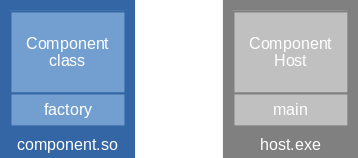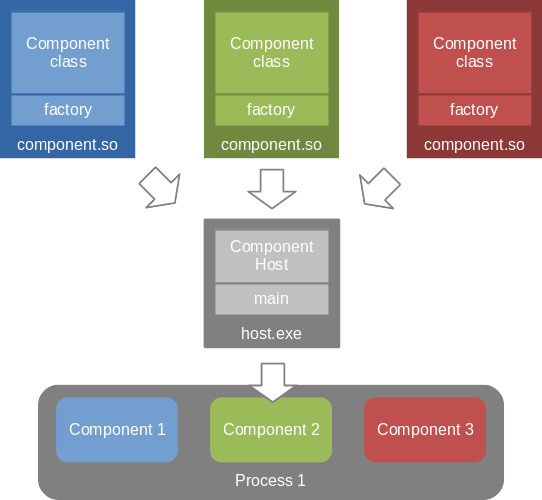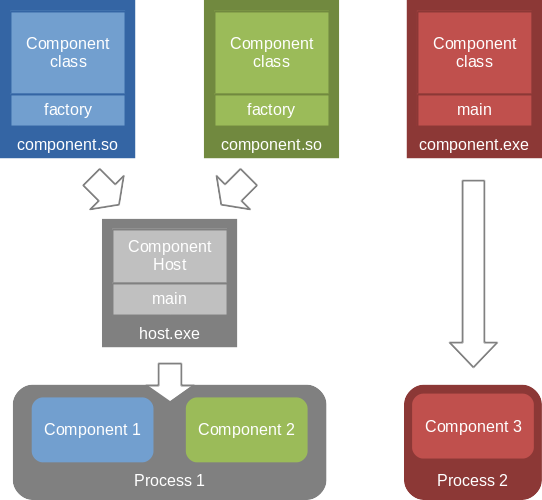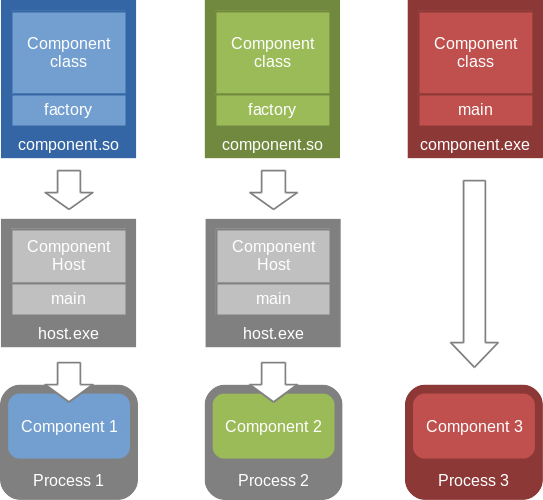Component Model Overview
REDHAWK 2.0 C++ Components
Historically in REDHAWK, a C++ component is an executable which contains both the component-specific implementation class (e.g., TuneFilterDecimate_i) and a small main() driver that creates and executes the component.
[component-exe]/img/component-exe.png)
Most of the actual work of main() is done inside of the core libraries, in the Resource_impl::start_component() function, so the generated main.cpp contains very little code.
Shared Address Space C++ Components
In order to support creating arbitrary components in the same address space, the creation of the component is separated from the management of the process.

The component code provides a factory function, make_component(), that implements creation of an instance of the specific component (this is a subset of what main() used to do). The rest of the component implementation remains the same.
A new meta-component handles the normal main() responsibilites, and provides an interface for the system to create a component inside its process space. This is called the ComponentHost.
REDHAWK 2.0 Process Model
The classic REDHAWK model is a 1:1 mapping of processes to components.

The component's executable is either run by the ApplicationFactory via the GPP, or directly within the Sandbox/Chalkboard. Either does a fork-and-exec; the component executable creates a single instance of the component, which then registers back with the ApplicationFactory or Sandbox.
Shared Address Space Process Model
The way to remove IPC costs is, naturally, to do away with the P (at least in part). This means a 1:N process-to-component mapping.

The Sandbox/Chalkboard or ApplicationFactory executes the component host, then launches the components into the host. The component host is capable of dynamically loading and unloading components and their dependencies; this allows the set of components running in the component host to change arbitrarily at run-time. The Sandbox benefits from this behavior now, since it doesn't know the future. Applications, on the other hand, do not support dynamic deployment yet.
Mixing Shared Libraries and Executables
The shared address space model does not affect existing components. Executable-based C++ components will still compile and run as-is; however, without updating and re-generating a component, it will not be able to take advantage of shared address space benefits.

The ability to generate executable components is not going away. Although I would expect it to be rare, there may be particular reasons why a given component cannot be run in a shared address space -- perhaps due to the requirements of an external library, for example.
Process Per Component
While the intent is to run all shared library components from an application in a single component host in order to take advantage of the benefits of memory sharing, the design does not require it (1 is a perfectly reasonable N in 1:N).

Each component can be launched in its own component host, giving the exact same behavior as REDHAWK 2.0 and prior. Or, a few troublesome components could be isolated from the rest by running them in their own component hosts, while the rest of the components share a host.
A further enhancement could allow an application designer to choose arbitrary groupings of components to be run in a set of component hosts, though I have my doubts as to how valuable this is when balanced against the complexity.